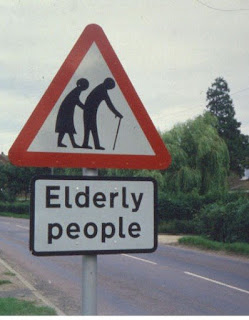 Well, I’m here. After nearly 24 hours of traveling, I have safely arrived back in Pennsylvania. Sights and sounds of my youth greet me at every turn, and I find myself entering a zone of comfort that only total familiarity can provide. These feelings of contentment have dominated my psyche, and driven me towards high expectations for what I may achieve while at home. Unfortunately, an emotion all too common in Northwestern Pennsylvania has begun to reveal itself. I feel it all around me, influencing all of my actions. Like quicksand, every attempt to free myself causes me to sink further into its unholy clutches. Now, many of you who have read my writings before may recognize the tone as a prelude to a further lament of my inherent laziness. While this is a good guess, it’s altogether incorrect. The feelings of malaise that I have begun to experience are not due to my own personal deficiencies, but by the very nature of my hometown. Therefore, I would like to introduce the nature of my community in order to shed some light onto one of the (many) reasons that I have become a past and future globetrotter, and why the feelings of abject apathy are nothing out of the ordinary.
Well, I’m here. After nearly 24 hours of traveling, I have safely arrived back in Pennsylvania. Sights and sounds of my youth greet me at every turn, and I find myself entering a zone of comfort that only total familiarity can provide. These feelings of contentment have dominated my psyche, and driven me towards high expectations for what I may achieve while at home. Unfortunately, an emotion all too common in Northwestern Pennsylvania has begun to reveal itself. I feel it all around me, influencing all of my actions. Like quicksand, every attempt to free myself causes me to sink further into its unholy clutches. Now, many of you who have read my writings before may recognize the tone as a prelude to a further lament of my inherent laziness. While this is a good guess, it’s altogether incorrect. The feelings of malaise that I have begun to experience are not due to my own personal deficiencies, but by the very nature of my hometown. Therefore, I would like to introduce the nature of my community in order to shed some light onto one of the (many) reasons that I have become a past and future globetrotter, and why the feelings of abject apathy are nothing out of the ordinary.To begin, I use the word “hometown” to describe Oil City, Franklin, and a few smaller towns that make up the immediate area. I do this because this term is convenient and sufficiently generic enough to sum up the area that I consider my “home.” After all, I am from a very rural era that retains its luster only for those with fond memories of a more prosperous past. Many of these people talk with pride (somewhat justifiably) about the area’s impact on world history. It was in my hometown that oil was first actively refined for eventual human over consumption. With the growth of the oil industry, the famous tycoon John Rockefeller entered the fray and used the area to help create the Standard Oil Company.
 This corporation eventually gave way to the modern brands (notably Pennzoil and Quaker State) which still exist today. Unfortunately, the companies decided to leave and since the early 90’s my community has drifted into an inescapable quagmire of disillusionment and apathy. It was as a part of this social and economic depression that I formulated my worldview and vowed never to stay in an area so obviously past its prime. Sadly, a majority of my former peers have not had the same good fortune, and therefore have fallen victim to the kind of lethargy hinted at in the opening paragraph.
This corporation eventually gave way to the modern brands (notably Pennzoil and Quaker State) which still exist today. Unfortunately, the companies decided to leave and since the early 90’s my community has drifted into an inescapable quagmire of disillusionment and apathy. It was as a part of this social and economic depression that I formulated my worldview and vowed never to stay in an area so obviously past its prime. Sadly, a majority of my former peers have not had the same good fortune, and therefore have fallen victim to the kind of lethargy hinted at in the opening paragraph.The kind of collective depression talked about above is in no way unique to my particular community. All over the United States, formerly wealthy (usually industrial) towns have fallen victim to a unique type of motivational deficiency that leaves them bitter and jaded. Lacking constructive occupations, government policies have enabled the population certain luxuries (through certain social welfare programs), while at same time unintentionally breaking their spirit through the constant reminder of their inability to do it on their own. These government handouts, usually in the form of food stamps or other privileges, enable the recipients to spend their discretionary income on certain leisure items. This only masks the disillusionment, in effect forcing a majority of people to be clueless about the source of their depression. So the question remains, if people have access to all the material goods they could ever desire, where does the depression come from? The answer is simple, while far from the material scarcities commonly associated with poverty in developing countries, the shortages seen in modern America is almost purely psychological, but equally as destructive.
In conclusion, this was the community that I grew up in, and where I am forced to return, albeit only occasionally. In an area where bars outnumber viable business, it’s easy to see that that my hometown it rotting from within.
 Despite this, the people have tried to make the best of things. Their lack of education forces them to gravitate towards interests that I find, boring, ridiculous, or even stupid. In any case, the community’s pursuit for anything to take their minds off the bleak world that they inhabit is something worth praising. Fortunately, the spirit of the region’s inhabitants is not the only advantage to growing up in Northwestern Pennsylvania. After all, its lack of any appealing traits resulted in my desire to leave. As a result, I have attended and graduated from university, traveled around the world, and forged personal and professional relationships. The constant reminder of home drives me to these ends, and any other place could have resulted in the victory of my omnipresent desire to succumb to laziness. If for no other reason, this alone makes my childhood home valuable, and my occasional return only helps reinforce my desire to free myself from the cycle of uncertainty and despair that afflicts a majority of those who remain here.
Despite this, the people have tried to make the best of things. Their lack of education forces them to gravitate towards interests that I find, boring, ridiculous, or even stupid. In any case, the community’s pursuit for anything to take their minds off the bleak world that they inhabit is something worth praising. Fortunately, the spirit of the region’s inhabitants is not the only advantage to growing up in Northwestern Pennsylvania. After all, its lack of any appealing traits resulted in my desire to leave. As a result, I have attended and graduated from university, traveled around the world, and forged personal and professional relationships. The constant reminder of home drives me to these ends, and any other place could have resulted in the victory of my omnipresent desire to succumb to laziness. If for no other reason, this alone makes my childhood home valuable, and my occasional return only helps reinforce my desire to free myself from the cycle of uncertainty and despair that afflicts a majority of those who remain here.
 Well the time is finally here. On Tuesday I will be leaving Japan for a brief visit back to the United States before finally moving on to Russia. It is hard for me to put into my words my feelings about my year spent in Japan. After all, my leaving has been a day I've been longing for since I arrived. Unfortunately this mind set has forced me to under appreciate the subtle positive aspects of my life here and instead I have frequently highlighted the consummate onslaught of negative features. In any event, as a way of saying farewell to a land of such amazing highs and lows, I have decided to focus on the agreeable tenets of my life while conspicuously ignoring any of my own dissenting opinions. I chose this option because the sheer magnitude of disappointments and frustrations that have greeted me throughout the year, would force me into a writing binge that would last no less than an week. Therefore and with my own health in mind, I have decided to make a top five list detailing what I believe to be the best parts of Japan.
Well the time is finally here. On Tuesday I will be leaving Japan for a brief visit back to the United States before finally moving on to Russia. It is hard for me to put into my words my feelings about my year spent in Japan. After all, my leaving has been a day I've been longing for since I arrived. Unfortunately this mind set has forced me to under appreciate the subtle positive aspects of my life here and instead I have frequently highlighted the consummate onslaught of negative features. In any event, as a way of saying farewell to a land of such amazing highs and lows, I have decided to focus on the agreeable tenets of my life while conspicuously ignoring any of my own dissenting opinions. I chose this option because the sheer magnitude of disappointments and frustrations that have greeted me throughout the year, would force me into a writing binge that would last no less than an week. Therefore and with my own health in mind, I have decided to make a top five list detailing what I believe to be the best parts of Japan.






 Recently, I decided to visit a local convenience store in the hopes of finding something delicious for lunch. As I walked, I was surprised to find myself in relatively good spirits due to the anticipation of my goal, a ham and cheese "sando" (sandwich in Japanese). All of my optimism for the day dissipated when I laid eyes on a gut wrenching scene of mindless destruction. A small white car had managed to jump over a six inch concrete barrier and crash through a large window in the front of the convenience store that held my prize. Shocked at the carnage, while at the same time puzzled about the logistics of a seemingly impossible act, I entered the store and looked around for clues concerning the identity of the perpetrator. It was then that I laid eyes on a culprit so obvious that my previous confusion seemed embarrassing. Before me stood a small shortsighted man looking dazed and slightly inane. He could have been no younger than 70 and his deficient brain capacity had accidentally caused him to back out of his parking space in "drive" rather than in "reverse." All of my fellow patrons showed utmost respect for a man who had just managed to destroy the frond end of the store, and the staff even gave him a hearty "thank you" when he bought a drink to tide him over during his wait for the authorities. It was into this display of lunacy that I realized the threat that hangs over us like adult diaper ready to burst. Evidently, old people are nothing more than a reactionary force bent on the propagation of outdated ideas, forced submission to their will, and worse, the threat of death from frequent mistakes involving mundane tasks. It is into this depressing world that I fire the first shot into the inevitable war between youth and the growing force of "Olds."
Recently, I decided to visit a local convenience store in the hopes of finding something delicious for lunch. As I walked, I was surprised to find myself in relatively good spirits due to the anticipation of my goal, a ham and cheese "sando" (sandwich in Japanese). All of my optimism for the day dissipated when I laid eyes on a gut wrenching scene of mindless destruction. A small white car had managed to jump over a six inch concrete barrier and crash through a large window in the front of the convenience store that held my prize. Shocked at the carnage, while at the same time puzzled about the logistics of a seemingly impossible act, I entered the store and looked around for clues concerning the identity of the perpetrator. It was then that I laid eyes on a culprit so obvious that my previous confusion seemed embarrassing. Before me stood a small shortsighted man looking dazed and slightly inane. He could have been no younger than 70 and his deficient brain capacity had accidentally caused him to back out of his parking space in "drive" rather than in "reverse." All of my fellow patrons showed utmost respect for a man who had just managed to destroy the frond end of the store, and the staff even gave him a hearty "thank you" when he bought a drink to tide him over during his wait for the authorities. It was into this display of lunacy that I realized the threat that hangs over us like adult diaper ready to burst. Evidently, old people are nothing more than a reactionary force bent on the propagation of outdated ideas, forced submission to their will, and worse, the threat of death from frequent mistakes involving mundane tasks. It is into this depressing world that I fire the first shot into the inevitable war between youth and the growing force of "Olds."

